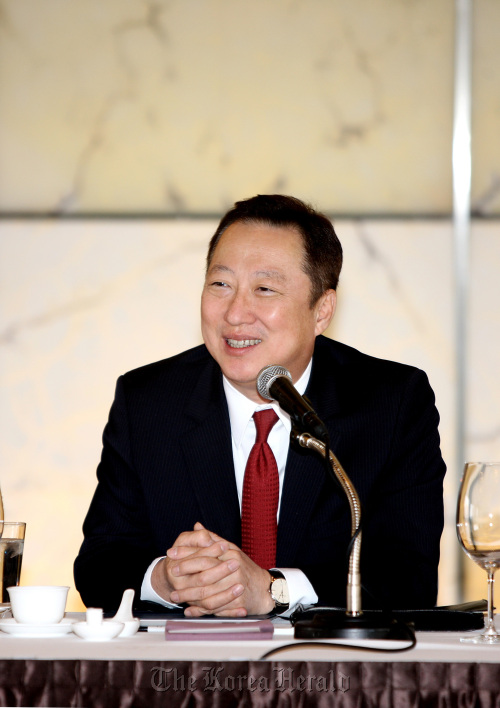Doosan Group is willing to engage in mergers and acquisitions that could expedite its growth and diversify revenue streams, its new chairman Park Yong-mann said Thursday.
Although he does not see any big deal at hand, the group’s affiliates constantly update their lists of potential partners, Park said. The group, for its part, also closely watches the market for firms that can provide new growth drivers.
“There are several acquisition targets but none of the deals are imminent,” he told a news conference in Seoul.

|
Park Yong-mann |
“We have established an M&A philosophy that requires clear objectives, affordability and the potential to speed up our operations. We would not get involved in any deal simply to expand our business scope.”
Park, 57, took the helm at Korea’s 10th largest conglomerate at the end of March and also oversees Doosan Infracore, the 116-year-old firm’s construction equipment unit. He succeeded Park Yong-hyun, his older brother and the fourth grandson of the group’s late founder Seung-jik.
Masterminding Doosan’s robust expansion at home and abroad, the new head has risen to prominence in recent years with a reputation for aggressive management style and M&A expertise.
Park has orchestrated 17 M&A deals since 1998, transforming a beer brewery into an international corporation with a diverse infrastructure-related portfolio. Among his signature deals was one with Ingersoll Rand in 2007 to take over Bobcat, the world’s largest maker of compact earth-movers for $4.9 billion.
“Signing an M&A agreement is only a starting point. More important is how to boost the firm’s value and spur growth afterward,” Park said.
In his inauguration speech on Monday, Park pledged to turn his company into one of the world’s 200 largest corporations. Doosan was ranked 488th in the 2011 Fortune 500.
To that aim, he plans to revamp the corporate culture and nurture talent as his two priorities. His first step was to hire a human resource specialist from General Electric, Park said.
“Given Korea’s relatively scarce capital and technological infrastructure, homegrown companies have to bet on manpower to set their roots and gain a competitive edge in the international market,” Park noted. “We are equipped with a workforce that lags behind no other country.”
By Shin Hyon-hee (
heeshin@heraldcorp.com)







